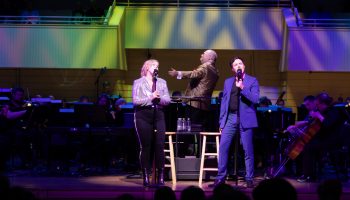
According to Galician bagpipe player Cristina Pato, one rhythm connects a diverse set of cultures — and in “Latina,” those rhythms will unite in an exploration of Latin music.
In its second Chautauqua performance this season, the Cristina Pato Quartet will perform “Latina” at 8:15 p.m., Tuesday, June 25 in the Amphitheater. The four instrumentalists explored migratory journeys Monday, June 24. Tuesday, they will turn to the 6/8 — a time signature used in places from the Italian peninsula all the way to the Pacific coast of South America.
The 6/8 is a set of six quarter notes that create a fast, waltz-like tune. Pato said that Italy’s tarantellas use the time signature, as does the Afro-Peruvian style landó. She and another member of the quartet, Edward Perez, created “Latina” as a creative journey through the diverse iterations of the 6/8.
“They sound totally different, and they are named differently,” Pato said. But, she added, these diverse styles connect through their shared rhythm.
Pato said she and her quartet members were trained in different musical traditions. The four instrumentalists will explore those traditions — both their differences and their connections — during the performance.
“‘Latina’ is very much connected to all of our work together,” Pato said. “(The performance is about) understanding the beauty of difference — embracing the idea that all these regions are interconnected and are not so far away from each other, and showcasing that through the music that we play.”
Pato is one of the world’s foremost Galician bagpipe, or gaita, players. She and the rest of the quartet are experienced musicians who have studied and played music from diverse cultures.
Perez, who plays double bass for the quartet, has performed across four continents. The New York City-based jazz musician is also experienced with Latin jazz and various traditional South American styles.
Mauricio Zottarelli, the quartet’s percussionist, is a Brazilian-born New Yorker and a recipient of various musical awards and scholarships in both the United States and Brazil.
Finally, French-born accordionist Julien Labro has studied and performed in Europe, the Middle East, North America and South America. He has led projects for 10 albums and collaborated with a long list of musicians, groups and orchestras.
Tonight’s performance will be Pato’s fourth time on the Amp stage. She first visited as a member of the Silkroad Ensemble and as a soloist with the Chautauqua Symphony Orchestra. As with Silkroad and its mission of cross-cultural collaboration, Pato said that she and her quartet hope to create a different understanding of cultural traditions with tonight’s performance.
“It’s a combination between sharing something that you are passionate about, but also learning a little deeper about other people and communities around the world,” Pato said.
Deborah Sunya Moore, vice president of performing and visual arts, said that Pato’s message of cultural sharing is right at the heart of Chautauqua’s aim for diversity and inclusion on the grounds and in its work.




